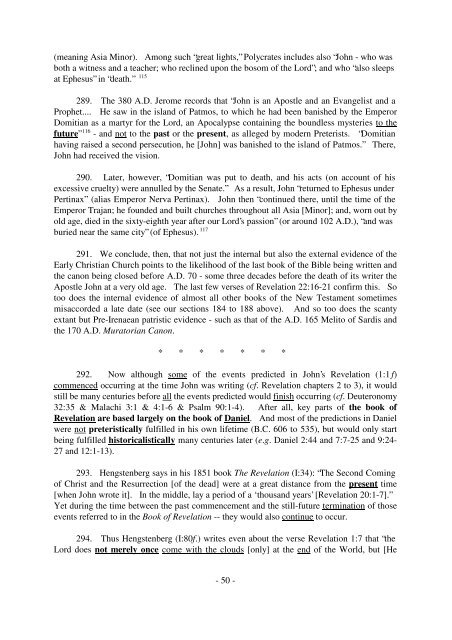JERUSALEM; ROME; REVELATION - The Preterist Archive
JERUSALEM; ROME; REVELATION - The Preterist Archive
JERUSALEM; ROME; REVELATION - The Preterist Archive
You also want an ePaper? Increase the reach of your titles
YUMPU automatically turns print PDFs into web optimized ePapers that Google loves.
(meaning Asia Minor). Among such “great lights,” Polycrates includes also “John - who was<br />
both a witness and a teacher; who reclined upon the bosom of the Lord”; and who “also sleeps<br />
at Ephesus” in “death.” 115<br />
289. <strong>The</strong> 380 A.D. Jerome records that “John is an Apostle and an Evangelist and a<br />
Prophet.... He saw in the island of Patmos, to which he had been banished by the Emperor<br />
Domitian as a martyr for the Lord, an Apocalypse containing the boundless mysteries to the<br />
future” 116 - and not to the past or the present, as alleged by modern <strong>Preterist</strong>s. “Domitian<br />
having raised a second persecution, he [John] was banished to the island of Patmos.” <strong>The</strong>re,<br />
John had received the vision.<br />
290. Later, however, “Domitian was put to death, and his acts (on account of his<br />
excessive cruelty) were annulled by the Senate.” As a result, John “returned to Ephesus under<br />
Pertinax” (alias Emperor Nerva Pertinax). John then “continued there, until the time of the<br />
Emperor Trajan; he founded and built churches throughout all Asia [Minor]; and, worn out by<br />
old age, died in the sixty-eighth year after our Lord’s passion” (or around 102 A.D.), “and was<br />
buried near the same city” (of Ephesus). 117<br />
291. We conclude, then, that not just the internal but also the external evidence of the<br />
Early Christian Church points to the likelihood of the last book of the Bible being written and<br />
the canon being closed before A.D. 70 - some three decades before the death of its writer the<br />
Apostle John at a very old age. <strong>The</strong> last few verses of Revelation 22:16-21 confirm this. So<br />
too does the internal evidence of almost all other books of the New Testament sometimes<br />
misaccorded a late date (see our sections 184 to 188 above). And so too does the scanty<br />
extant but Pre-Irenaean patristic evidence - such as that of the A.D. 165 Melito of Sardis and<br />
the 170 A.D. Muratorian Canon.<br />
* * * * * * *<br />
292. Now although some of the events predicted in John’s Revelation (1:1 f)<br />
commenced occurring at the time John was writing (cf. Revelation chapters 2 to 3), it would<br />
still be many centuries before all the events predicted would finish occurring (cf. Deuteronomy<br />
32:35 & Malachi 3:1 & 4:1-6 & Psalm 90:1-4). After all, key parts of the book of<br />
Revelation are based largely on the book of Daniel. And most of the predictions in Daniel<br />
were not preteristically fulfilled in his own lifetime (B.C. 606 to 535), but would only start<br />
being fulfilled historicalistically many centuries later (e.g. Daniel 2:44 and 7:7-25 and 9:24-<br />
27 and 12:1-13).<br />
293. Hengstenberg says in his 1851 book <strong>The</strong> Revelation (I:34): “<strong>The</strong> Second Coming<br />
of Christ and the Resurrection [of the dead] were at a great distance from the present time<br />
[when John wrote it]. In the middle, lay a period of a ‘thousand years’ [Revelation 20:1-7].”<br />
Yet during the time between the past commencement and the still-future termination of those<br />
events referred to in the Book of Revelation -- they would also continue to occur.<br />
294. Thus Hengstenberg (I:80f.) writes even about the verse Revelation 1:7 that “the<br />
Lord does not merely once come with the clouds [only] at the end of the World, but [He<br />
- 50 -
















